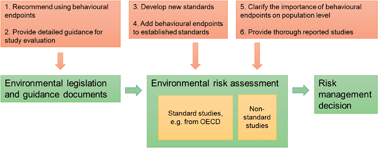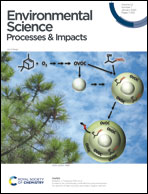Emerging investigator series: use of behavioural endpoints in the regulation of chemicals
Abstract
Interest in behavioural ecotoxicology is growing, partly due to technological and computational advances in recording behaviours but also because of improvements of detection capacity facilitating reporting effects at environmentally relevant concentrations. The peer-reviewed literature now contains studies investigating the effects of chemicals, including pesticides and pharmaceuticals, on migration, dispersal, aggression, sociability, reproduction, feeding and anti-predator behaviours in vertebrates and invertebrates. To understand how behavioural studies could be used in regulatory decision-making we: (1) assessed the legal obstacles to using behavioural endpoints in EU chemicals regulation; (2) analysed the known cases of use of behavioural endpoints in EU chemicals regulation; and (3) provided examples of behavioural endpoints of relevance for population level effects. We conclude that the only legal obstacle to the use of behavioural endpoints in EU chemicals regulation is whether an endpoint is considered to be relevant at the population level or not. We also conclude that ecotoxicity studies investigating behavioural endpoints are occasionally used in the EU chemicals regulation, and underscore that behavioural endpoints can be relevant at the population level. To improve the current use of behavioural studies in regulatory decision-making contribution from all relevant stakeholders is required. We have the following recommendations: (1) researchers should conduct robust, well-designed and transparent studies that emphasize the relevance of the study for regulation of chemicals; (2) editors and scientific journals should promote detailed, reliable and clearly reported studies; (3) regulatory agencies and the chemical industry need to embrace new behavioural endpoints of relevance at the population level.

- This article is part of the themed collections: Emerging Investigator Series and Best Papers 2020 – Environmental Science: Processes & Impacts


 Please wait while we load your content...
Please wait while we load your content...